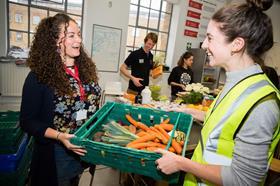
Food redistributor FareShare saves the UK economy around £51 million a year according to a new report released by the charity.
The Wasted Opportunity Report, carried out by NEF consulting, evaluated the economic and social value of redistributed surplus food, as well as the current and potential cost avoided by the UK public sector as a result of the charity’s work.
It found that by collecting food that would otherwise go to waste and redistributing it to charity and community groups, FareShare saves the wider economy approximately £50.9m each year.
This includes £6.9m in social value to the beneficiaries themselves and £44 million in savings to the state – for the NHS, the criminal justice system, schools and social care.
If FareShare and other charities in the food redistribution sector were able to scale up their operational capacity and handle 50 per cent of the surplus food available in the UK supply chain, the value back to the state could be as much as £500m a year.
In FareShare’s annual report, also published on 22 October, the charity announced that in 2017-2018 it redistributed 17,000 tonnes of in-date, good-to-eat surplus food – enough to create almost 37m meals.
This surplus food is worth £30m a year in cash savings to the charitable sector, and it means charities can spend more on delivering their frontline services.
The report follows the announcement by Defra secretary Michael Gove of a £15m pilot project that aims to make it as cost-effective for the food industry to redistribute its surpluses to charities as it is to dispose of them as waste.
FareShare is also launching a new campaign called ‘Good Food Does Good’, to encourage more businesses to redistribute their surpluses by demonstrating the difference the food makes to the charities and individuals that receive it.
The charity’s chief executive, Lindsay Boswell, said: “We have always known food is a catalyst for good and now we are able to evidence it.
“A balanced, nutritious diet provides obvious health benefits, but sharing a meal also helps alleviate loneliness and reduces the number of times an isolated person may, for example, book a GPs appointment just so they have someone to talk to.
“The costs avoided by the state by charities serving up nutritious meals with FareShare food is worth a staggering £51m every year, and that’s with us accessing just five per cent of the surplus food available. Imagine what we could do if we could get more of it.”
He added: “We want to be clear – the food we redistribute is in date and good quality, just like the food you’d eat at home. That’s why we’re also launching our Good Food Does Good campaign, to show off our incredible fresh food and to celebrate the amazing businesses who are already giving us their surplus.”
FareShare is the UK’s largest charity fighting hunger and food waste. It redistributes surplus food from the UK supply chain and delivers it to nearly 10,000 charities and community groups, including homeless hostels, children’s breakfast clubs, domestic violence refuges and community cafes.



